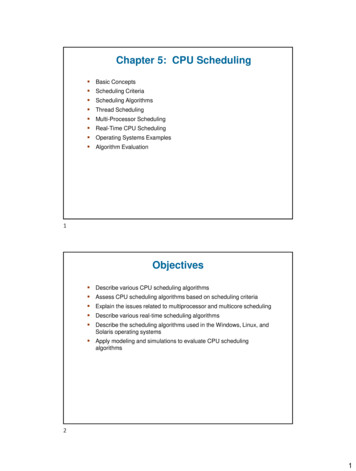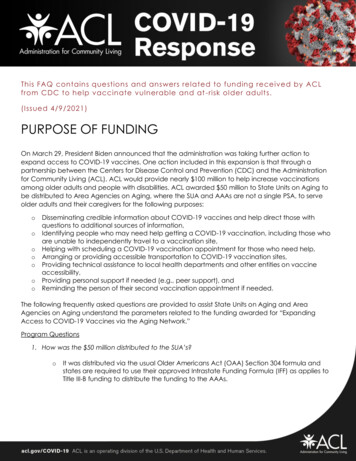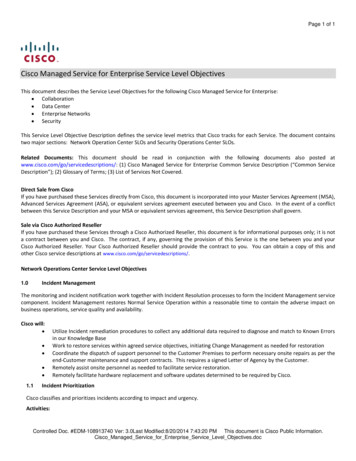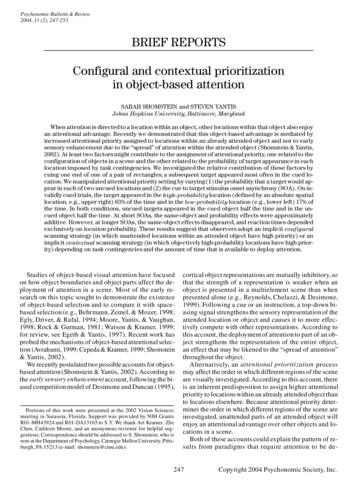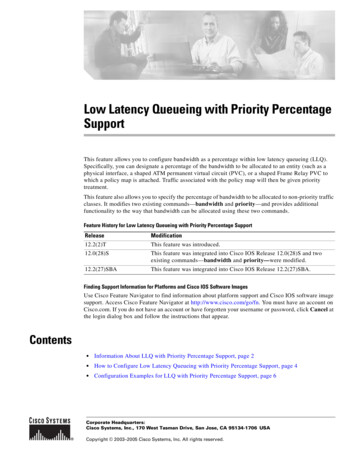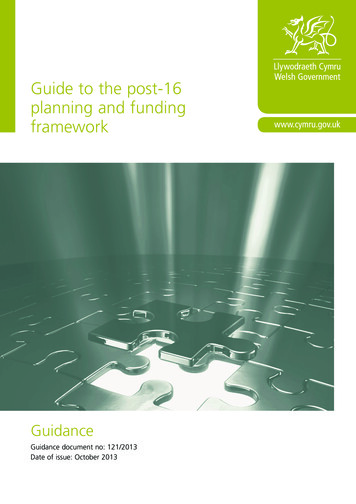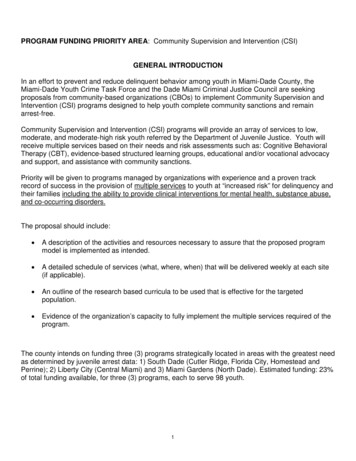
Transcription
PROGRAM FUNDING PRIORITY AREA: Community Supervision and Intervention (CSI)GENERAL INTRODUCTIONIn an effort to prevent and reduce delinquent behavior among youth in Miami-Dade County, theMiami-Dade Youth Crime Task Force and the Dade Miami Criminal Justice Council are seekingproposals from community-based organizations (CBOs) to implement Community Supervision andIntervention (CSI) programs designed to help youth complete community sanctions and remainarrest-free.Community Supervision and Intervention (CSI) programs will provide an array of services to low,moderate, and moderate-high risk youth referred by the Department of Juvenile Justice. Youth willreceive multiple services based on their needs and risk assessments such as: Cognitive BehavioralTherapy (CBT), evidence-based structured learning groups, educational and/or vocational advocacyand support, and assistance with community sanctions.Priority will be given to programs managed by organizations with experience and a proven trackrecord of success in the provision of multiple services to youth at “increased risk” for delinquency andtheir families including the ability to provide clinical interventions for mental health, substance abuse,and co-occurring disorders.The proposal should include: A description of the activities and resources necessary to assure that the proposed programmodel is implemented as intended. A detailed schedule of services (what, where, when) that will be delivered weekly at each site(if applicable). An outline of the research based curricula to be used that is effective for the targetedpopulation. Evidence of the organization’s capacity to fully implement the multiple services required of theprogram.The county intends on funding three (3) programs strategically located in areas with the greatest needas determined by juvenile arrest data: 1) South Dade (Cutler Ridge, Florida City, Homestead andPerrine); 2) Liberty City (Central Miami) and 3) Miami Gardens (North Dade). Estimated funding: 23%of total funding available, for three (3) programs, each to serve 98 youth.1
The contract period is for one year with renewal options for up to three years. Renewals are notautomatic. Renewals will be based upon satisfactory performance and contract compliancedetermined through evaluation by the Independent Evaluator, Miami-Dade Contract Management,Miami Dade Juvenile Services Department and the Department of Juvenile Justice. Renewal and orfunding determinations will also be subject to oversight and change by Miami-Dade County’s YouthCrime Task Force and the Dade-Miami Criminal Justice Council pursuant to assessmentof community service needs.PROGRAM MODELCommunity Supervision and Intervention (CSI) programs are intended to provideintensive individualized interventions where youth will participate in an array of wrap-around servicesbased on their needs and risk assessments (e.g. low, moderate, and moderate-high risk) serviceneeds analysis and court-ordered sanctions. The proposed model should incorporate a variety ofstrategies that will result in the completion of prescribed sanctions and services. The length of time ittakes a youth to successfully complete a CSI program will vary, but should be no less than sixmonths.Services shall include but not be limited to: Cognitive Behavioral Therapy (CBT) Full Spectrum,evidence-based structured learning groups, educational and/or vocational support and assistancewith community sanctions including community service. The model should also incorporate areasmost often ordered by the courts for adjudicated youth e.g. trauma informed interventions, conflictresolution, anger management, and pro-social life skills training.If interagency referrals are needed to provide services, the proposer must submit in this proposal aMemorandum of Understanding with a partner agency, documenting the process for referring youth(and/or families) for mental health and/or substance abuse services. Note that the CSI program isresponsible for submitting to probation officers monthly updates from therapists.Note: Interventions and program activities determined by the Office of Juvenile Justice andDelinquency Prevention (OJJDP), U.S. Department of Health & Human Services (H&HS), etc., to bemore harmful than helpful, or generally ineffective shall not be used. Examples are: “scared straight”approaches, boot camps, jail tours, and groupings of arrested youth with different levels of criminaljustice involvement and children 12 and under with older teens.Targeted ParticipantsCSI programs target juvenile offenders ages 13 - 18 years who have been adjudicated delinquent orhave had adjudication withheld, and are under the supervision of the Juvenile Court and the FloridaDepartment of Juvenile Justice: youth assessed as Low, Moderate, Moderate-High risk to offenddetermined by the Positive Achievement Change Tool (PACT). Exceptions may be made for youth upto 22 years of age that are subject to court ordered supervision by the Department of JuvenileJustice.2
Participant ReferralsReferrals to the program come exclusively from the Department of Juvenile Justice (DJJ). Youthreferred for services should be contacted within 48 hours or as soon as possible (i.e. if the juvenile isdetained, upon release). The referral agency should be immediately notified if the program has awaiting list, or if services to the family cannot begin within 2 weeks.The grantee is fully responsible for obtaining referrals by maintaining regular contact with relevantJuvenile Probation Officers. Programs should promote themselves and the CSI concept among theJuvenile Court Judges, Assistant Public Defenders, and Assistant State Attorneys so the requirementto attend a CSI can be included in the JPO’s Pre-Dispositional Report for juvenile court.Program Completion RequirementsProgram completion is based on youth completing a continuum of program activities as specified inthe referral, including the fulfillment of court orders such as community service requirements andschool performance. The length of time it takes a youth to successfully complete the program willvary, but youth are expected to be engaged by the program for no less than six months.StaffingThe program should identify a position with primary responsibility for the management and executionof all grant activities. The individual must devote sufficient time and possess the educational and/orpractical experience and commitment to assure the successful achievement of the program goals andobjectives.Therapeutic services such as Cognitive Behavioral Therapy (CBT) and Trauma Informed Therapymust be provided by a Masters’ level clinician with appropriate training or certification in the specificintervention offered.Direct service staff must hold at least a Bachelor’s degree in social work, criminal justice, psychology,mental health counseling, or related field and have at least two (2) years of relevant experience inworking with delinquent youth.SCOPE OF SERVICES AND PERFORMANCE STANDARDSProgram services are expected to reduce re-arrests by promoting positive behavior. DJJassessments and court sanctions will guide service delivery which is intended to be individualized.Note that in instances where a specific service cannot be directly provided by the proposing agency,a Memorandum of Understanding (or contract) must be included in the application detailing how theservice will be delivered and the on-going documentation that will be required, provided. The CSIprogram is responsible for providing feedback on the youth’s progress in all aspects of the programincluding monthly updates from therapists.1. Enroll 98 youth in a CSI program that includes an array of services as described above for no lessthan six months.3
Performance standard: A client is officially enrolled when a completed enrollment record,documentation of two (2) weeks attendance, pre-test, and requisite consent forms are submittedto the independent evaluator.NOTE: The length of time it takes a youth to successfully complete a CSI program will vary, butshould be no less than six months.2. Implement a case management component that begins at program intake and includes thedevelopment of an individual program plan that addresses the needs of youth based on DJJassessments and court-ordered sanctions. Plans shall be updated at least monthly and morefrequently as required.Performance standard: Provide on-going case management as needed, including: One to three (1 - 3) home visit to assess living conditions and engage the youth and family asit relates to youth’s success in the program. Community service requirements from court-ordered sanctions must be fulfilled by youth whilein the program. Provide necessary assistance to accomplish this task. Inform families about the juvenile justice system, including court processes and up-to-datecontact/phone numbers. Provide interagency referrals to youth and family members as needed and support youth andfamily through the referral process to ensure that the connection is made. Program staffshould document referrals, follow-up on referrals, and provide DJJ with on-going feedback onthe status of referrals, e.g. therapy reports, Workforce Miami reports. Monitor and document youth’s participation and progress in all aspects of the program in casefiles.3. Provide modularized structured learning groups that emphasize conflict resolution, angermanagement, pro-social life skills training, and cognitive behavior modification strategies whileaddressing delinquency risk factors such as antisocial behavior, school performance, angermanagement, achievement motivation and attitude toward conflict/violence.Performance standard: Youth will be involved in weekly modularized structured learning groupsper research based curriculum.The structured learning groups should follow a research-based curriculum that incorporates acognitive behavioral approach to both enhancing protective factors and reducing risk factorsassociated with delinquency. The proposer should provide an outline from the curricula to be used,indicating the source and associated costs if any. The Department of Juvenile Justice must approveall curricula selections and any changes. The curricula must be modularized, interactive and coordinated so that youth have theopportunity to make-up missed sessions to complete full intervention. Participation must be documented in attendance logs and the case file.4
4. Provide intensive mental health and substance abuse services as needed.Performance standard: Provide youth with intensive mental health and/or substance abusecounseling OR refer as needed. Engage youth in therapeutic counseling services such as Cognitive Behavioral Therapy orTrauma Informed Therapy as indicated on referral OR Have a Memorandum of Understanding with a partner agency, documenting the process forreferring youth (and/or families) for mental health and/or substance abuse services. Note thatthe CSI program is responsible for submitting monthly updates from therapists. Conduct drug testing as needed.5. Provide advocacy for clients with respect to their court order sanctions.Performance standard: Program staff will attend court hearings with clients, report to the courton the youth’s progress in the program, and document these activities in the youth’s case file.6. Serve as an educational and/or vocational liaison and advocate for the youth as needed including:Performance Standards: For youth in school, provide a range of support activities to enhanceschool attendance, behavior and academic performance as needed. If school issues arise such as suspensions or academic failure, provide youth (and caregiver)advocacy at the school site, e.g. meet with school personnel. Develop and implement a process for obtaining teacher feedback for students with behaviorand/or academic issues, e.g. daily or weekly progress reports signed by teachers, e-mails orphone calls to school staff. As needed, identify and coordinate tutoring services. Obtain on-going feedback from tutors,teachers, and parents regarding progress. Develop and implement a process to monitor attendance, e.g. daily progress reports andparents/caregivers are contacted via telephone or home visit after five unexcused absences ortwo consecutive absences. If school attendance continues to be an issue, a meeting should beset up with the school (counselors and/or teachers and administrators), parents/caregivers,and program staff.For youth who dropped out of school, provide vocational/educational support including educationalplans to return to school or to pursue vocational training or employment.5
7. Involve participant’s parents/caregivers in program activities.Performance standards: Maintain contact with parents and caregivers while the youth is in the program providing themwith feedback regarding the progress of their child in the program. Staff will contact parents/caregivers if the youth is suspended from school, is experiencingattendance issues or is re-arrested to discuss appropriate strategies to implement.8. The program is required to help eliminate obstacles to participation.Performance standards: Assist youth and families transportation, e.g. bus tokens. Provide flexible working hours for staff to ensure that program activities are available attimes/days convenient for clients, e.g. afternoon, evening and/or weekend. During group sessions, provide activities (childcare) to younger siblings who may represent anobstacle to program participation. Provide snacks.9. The program is fully staffed by appropriately qualified personnel.Performance standard: Staff meets the qualifications specified in the RFP including havingsufficient staff trained in the intervention to assist when staff are absent or vacancies occur. Staffvacancies are filled in 30 days or less by temporary or permanent staff.10. On a monthly basis, report youth’s progress in all aspects of the program.Performance standard: Provide DJJ probation officers with monthly feedback reports on theyouth’s progress (or lack thereof) as documented in case files, sign-in sheets, and reportsrelated to referrals.11. Program staff must fully cooperate with the independent evaluator.Performance standard: Provide completed enrollment forms on time, completed pre-tests andpost-tests at appropriate times, and have the program and staff available for evaluatorconsultation at mutually agreed upon times.6
PARTICIPANT OUTCOMES AND INDICATORSThe following list does not constitute all data possibilities but rather provides a sample of the kinds ofinformation that will be required when full cooperation with the independent evaluator occurs. Fundedproviders are expected to collect and track individual participant data in collaboration with theindependent evaluator. The expected outcomes identified below are consistent with the overall goalof this priority area and may be used along with other indicators to track program success. Theoutcomes and indicators below must linked to program services and the evidence based curriculum.Applicants may include additional outcomes and/or indicators.Expected OutcomeIndicator90% of enrolled youth should complete theprogram and their court ordered sanctions andservices.# and % of referred youth complete alltasks needed to comply with sanctions;documented by youth enrollment andprogram attendance records.# and % of youth completing communityservice requirements.80% of youth who complete the program willimprove (or maintain positive) pro-socialattitudes including: achievement motivation,attitude toward conflict resolution, and attitudetoward school.# and % of youth who improve theirachievement motivation on pre and postmeasures.# and % of youth who improve theirattitude toward conflict/violence on preand post measures.# and % of youth who improve theirattitude toward school on pre and postmeasures.80% of youth who complete the program willimprove (or maintain positive) schoolattendance and school conduct.# and % of youth who improve theirschool attendance on pre and postschool reports.# and % of youth who improve theirschool conduct on pre and post schoolreports.85 % of youth will not be re-arrested duringprogram participation.# and % of youth who are not rearrested while participating in theprogram.80% of the youth who complete the programwill have fewer re-arrests after 6 months ormore, than non-completers.# and % of referred youth who are notre-arrested within 6 months or more ofprogram completion.7
OTHER REQUIREMENTSProgram DocumentationMonthly feedback on each client’s progress in the program should be provided to the referring agencyor more frequently as required.All program activities, structured learning groups, home visits, referrals to other agencies for services,school meetings, etc. must be documented in each client-child’s case file and supported byparticipant sign-in sheets and case notes.EvaluationAn independent evaluation will be conducted for all programs and will assess the extent to whichprogram performance standards and participant outcomes are achieved. In addition, the independentevaluator will aid in the process of implementation and provide evaluation instruments, relatedtraining and technical assistance.Contract PeriodThe contract period is for one year with renewal options for up to three years. Renewals are notautomatic. Renewals will be based upon satisfactory performance and contract compliancedetermined through evaluation by the Independent Evaluator, Miami-Dade Contract Management,Miami Dade Juvenile Services Department and the Department of Juvenile Justice. Renewal and orfunding determinations will also be subject to oversight and change by Miami-Dade County’s YouthCrime Task Force and Criminal Justice Council pursuant to assessments of community serviceneeds.8
PROGRAM FUNDING PRIORITY AREA: Family Empowerment Program (FEP)GENERAL INTRODUCTIONIn an effort to prevent and reduce delinquent behavior among youth in Miami-Dade County, theMiami-Dade Youth Crime Task Force and the Dade Miami Criminal Justice Council are seekingproposals from community-based organizations (CBOs) to implement Family EmpowermentPrograms.Family Empowerment Programs (FEPs) include multiple services and/or activities designed to reducethe impact of familial risk factors that contribute to delinquency. The program is meant to be shortterm (3 – 4 months) and intensive (offered more than once a week).Priority will be given to programs managed by organizations with experience and a proven trackrecord of success in the provision of multiple services to youth at risk for delinquency and theirfamilies including the ability to provide clinical interventions for mental health, substance abuse, andco-occurring disorders.The proposal should include: A description of the activities and resources necessary to assure that the proposed programmodel is implemented as intended. A detailed schedule of services (what, where, when) that will be delivered weekly at each site(if applicable). An outline of the research based curricula to be used that is effective for the targetedpopulation. Evidence of the organization’s capacity to fully implement the multiple services required of theprogram.The county intends on funding four (4) programs strategically located in areas with the greatest needas determined by juvenile arrest data: 1) South Dade (Cutler Ridge, Florida City, Homestead andPerrine); 2) Liberty City (Central Miami) 3) Hialeah; and 4) Miami Gardens (North Dade). Estimatedfunding: 13% of total funding available for four (4) programs, each to serve 50 youth and families.The contract period is for one year with renewal options for up to three years. Renewals are notautomatic. Renewals will be based upon satisfactory performance and contract compliancedetermined through evaluation by the Independent Evaluator, Miami-Dade Contract Management,Miami Dade Juvenile Services Department and the Department of Juvenile Justice. Renewal and orfunding determinations will also be subject to oversight and change by Miami-Dade County’s YouthCrime Task Force and Criminal Justice Council pursuant to assessment of community service needs.9
PROGRAM MODELFamily Empowerment Programs are primarily group oriented, with additional services such as casemanagement and advocacy provided to families individually. Programs are expected to facilitatestructured learning groups for youth, for parents and for youth and parents together. The curriculashould be research-based and modularized with youth and parents entering the program at any pointfor a period of approximately three months.Group sessions should promote family stability, pro-social behavior and parental involvement at homeand in school. The three curricula must be interactive and coordinated, so activities and subjectmatter in the youth groups will correspond to the exercises occurring in the parent groups and in thejoint groups.Note: Interventions and program activities determined by the Office of Juvenile Justice andDelinquency Prevention (OJJDP), U.S. Department of Health & Human Services (H&HS), etc., to bemore harmful than helpful, or generally ineffective shall not be used. Examples are: “scared straight”approaches, boot camps, jail tours, and groupings of arrested youth with different levels of criminaljustice involvement, and younger with older teens.Targeted ParticipantsFamily Empowerment Programs target juvenile offenders, ages 12 - 17, and their families. Theprograms are exclusively for youth and families referred by the Juvenile Services Department (JSD).Participant ReferralsReferrals to the program come exclusively from case managers in Miami-Dade County’s JuvenileServices Department (JSD). Families referred for services should be contacted within 48 hours or assoon as possible (i.e. if the juvenile is detained, upon release). The referral agency should beimmediately notified if the program has a waiting list, or if services to the family cannot begin within 2weeks.The grantee is fully responsible for obtaining referrals. Programs must promote themselves bymaintaining regular contact with case managers including phone calls, e-mails, and by attendingmonthly program staffing meetings at JSD.Participant Completion RequirementsYouth who successfully complete the program are expected to be involved in no less than 24structured learning groups: 12 with youth and 12 with parents. Parents are expected to attend aminimum of 18 structured learning groups: 9 with parents and 9 with youth. The program is meant tobe short-term (3 – 4 months) and intensive (offered more than once a week).10
StaffingThe program should identify a position with primary responsibility for the management and executionof all grant activities. The individual must devote sufficient time and possess the educational and/orexperience and commitment to assure the successful achievement of the program goals andobjectives. Program staff should have at least two years of relevant experience in dealing withculturally and ethnically diverse delinquent youth and their families.Oversight of clinical service staff must be provided by a person with at least a Master’s degree.Direct service staff must hold at least a Bachelor’s degree in social work, psychology, criminal justiceor related field and have at least two (2) years of relevant experience in dealing with culturally andethnically diverse delinquent youth and their families.SCOPE OF SERVICES AND PERFORMANCE STANDARDSServices must be designed to reduce the impact of familial risk and protective factors linked todelinquency. The proposer must use one or more of the following research-based curricula: GuidingGood Choice, Parenting Wisely, Parenting with Love and Limits, Strengthening Families. Theproposal should include three outlines specifying topics/activities for youth groups, for parent groupsand for youth/parent groups and include associated costs if applicable. Youth Crime Task Force staffmust approve all curricula selections and any changes during the program’s implementation.1. Enroll 50 youth and families in a Family Empowerment Program for no less than twelve (12)weeks of programming.Performance standard: A client is officially counted enrolled when a completed enrollment record,documentation of two (2) weeks of attendance, pre-test, and requisite consent forms aresubmitted to the independent evaluator.2. Provide modularized structured learning groups involving each youth that emphasize cognitivebehavior modification strategies and focusing on behavioral interventions and social skillsdevelopment. Group sessions will address the risk factors of antisocial behavior, schoolperformance, anger management, achievement motivation and attitude toward conflict/violenceand family conflict.Performance standard: Each youth is involved in a 60-minute modularized structured learninggroup twice (2) a week, documented in case file and attendance records.3. Parental participation is required. Provide modularized structured learning groups involvingparents/caregivers that address the risk factors of family management problems, family conflict,and early and persistent antisocial behavior by their children. Parent learning groups consist ofgroup counseling sessions that are psycho-educational in form and function, and combine the useof various didactic, instructional, and audio-visual techniques to train parents in familymanagement, family communication, and other parenting skills in which they may be deficient.Performance standard: Involve at least one parent/caregiver of each youth in no less than one (1)weekly, 60 -minute parent modularized structured learning group, documented in case file andattendance records.11
4. Provide modularized structured learning groups involving youth and their parents together inexperiential learning activities. These sessions will provide an opportunity for youth and adults todiscuss common topics/themes from their respective structured learning groups. The focus will beon how effectively the family unit has been able to develop and apply new competencies on a dayto-day basis.Performance standard: Involve each child and at least one parent/caregiver of each child in noless than one (1) weekly, 60-minute joint modularized structured experiential learning group,documented in case file and attendance records.5. Provide on-going case management as needed (see below):Performance standards: Conduct at least one (1) home visit indicating that a face-to-face interview occurred during thefirst three (3) weeks of enrollment. The home visit should be completed in the setting in whichthe client resides. If a home visit could not be facilitated, a face-to-face interview must beconducted in another setting. Assist youth in completing JSD tasks such as community service projects/hours, as needed. Provide family with up-to-date case manager contact information including phone number ande-mail address. Link youth and families to services and activities through interagency referrals as needed.Maintain contact to ensure that the connection is made and during service delivery e.g. followup with mentorship waiting lists, monitor school appointments, obtain monthly reports fromtherapists. Assist youth and parents in navigating and advocating within Miami-Dade County PublicSchools System and/or charter or vocational schools as needed. Monitor and document youth and parent participation and progress in all aspects of theprogram with sign-in sheets and in case files.6. Serve as an educational and/or vocational liaison and advocate for the youth as needed including:Performance Standards: For youth in school, provide a range of support activities to enhanceschool attendance, behavior and academic performance as needed. If school issues arise such as suspensions or academic failure, provide youth (and caregiver)advocacy at the school site, e.g. meet with school personnel. Develop and implement a process for parents to obtain teacher feedback for students withbehavior and/or academic issues, e.g. daily or weekly progress reports signed by teachers, emails or phone calls to school staff. As needed, identify and coordinate tutoring services. Obtain on-going feedback from tutors,teachers, and parents regarding progress.12
Develop and implement a process to monitor attendance, e.g. daily progress reports andparents/caregivers are contacted via telephone or home visit after five unexcused absences ortwo consecutive absences. If school attendance continues to be an issue, a meeting shouldbe set up with the school (counselors and/or teachers and administrators), parents/care givers,and program staff.For youth who dropped out of school, provide vocational/educational support including educationalplans to return to school or to pursue vocational training or employment.7. Provide intensive mental health and substance abuse services as needed.Performance standard: Provide youth with intensive mental health and/or substance abusecounseling OR refer as needed. Engage youth in therapeutic counseling services such as Cognitive Behavioral Therapy orTrauma Informed Therapy as indicated on referral OR Have a Memorandum of Understanding with a partner agency, documenting the process forreferring youth (and/or families) for mental health and/or substance abuse services. Note thatthe FEP program is responsible for submitting monthly updates from therapists. Conduct drug tests on as needed basis.8. The program is required to help eliminate obstacles to youth and family participation.Performance standards:9. Assist with transportation as needed, e.g. bus tokens Provide flexible working hours for staff to ensure that program activities are available attimes/days best suited for parents, e.g. late afternoon, evening, or weekend. During group sessions, provide childcare or activities to younger siblings who may representan obstacle to program participation. Provide snacks.Program staff must
CSI programs target juvenile offenders ages 13 - 18 years who have been adjudicated delinquent or have had adjudication withheld, and are under the supervision of the Juvenile Court and the Florida Department of Juvenile Justice: youth assessed as Low, Moderate, Moderate-High risk to offend

